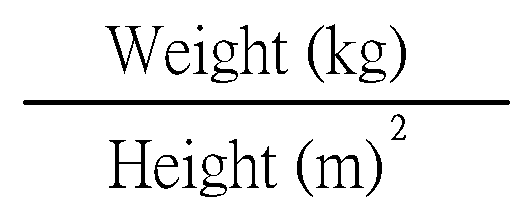Site Map Vital Links Contact Me
![]()
| Content | Healthy and Society | Knowledge of Exercise | Healthy Exercise | Video of Healthy Exercises |
| Injury from Exercise | Physical Exercise | Healthy Diet | BMI | Guest Book |
![]()

The Body Mass Index (BMI) is one of the methods for measuring overweight and obesity.
The formula of BMI

For assessing obesity in adult populations, according to the World Health Organization, BMI 25-29.9 kg/m2 is classified as overweight and BMI 30 kg/m2 or above is classified as obesity.
Obesity increases the risk for a number of diseases, such as hypertension, ischemic heart disease, hypercholesterolemia, diabetes, cerebrovascular disease, gall bladder disease, osteoarthritis, sleep apnoea and some types of cancer (breast, prostate, colon and endometrial).
BMI Recommendations :
BMI < 18.5 (Underweight)
Your current BMI falls within the range of underweight. Underweight is associated with health risks such as poor immune function and osteoporosis. Hence, you are advised to increase total caloric intake and follow the recommendations of the Food Guide Pyramid by consuming a variety of nutrients from different food groups. Stop immediately if you are on any special diet or programme for weight loss. Please consult a dietitian for your specific nutritional needs and seek medical advice if you lose weight unintentionally or progressively.
18.5 < BMI < 25 (Normal range)
Your BMI is in the normal range. However, a normal weight does not necessarily mean optimal health. Thus you should follow a balanced diet, exercise regularly and lead a healthy lifestyle while maintaining your weight.
25 < BMI < 30 (Obese)
Your current BMI falls within the range of obesity. Obesity is an important risk factor for various chronic diseases such as diabetes, cardiovascular diseases, osteoarthritis and certain cancers. You should strive for a balance between energy intake and expenditure by being more active and following a calorie-controlled but balanced diet. It is also important to seek health advice and set up a realistic weight management goal with your doctor and dietitian.
BMI > 30 (overweight)
Your current BMI falls within the range of obesity, it is very severe, so it is very important to seek health advice and set up a realistic weight management goal with your doctor and dietitian.

A survey in Hong Kong showed that, 32.6% of men and 26.7% of women were overweight while 5.4% of men and 7.0% of women were obese*. Statistics from the Student Health Service under the Department of Health found that approximately 14% and 12% of primary and secondary school students (school year 2000/01) are obese respectively.
Balanced diet and regular exercise are the proven ways to achieve and maintain ideal body weight.
You may browse the Health Zone. for further advice on physical exercise, healthy diet and common killer diseases associated with obesity.
More Information in
[ Content ] [ Healthy and Society ] [ Knowledge of Exercise ] [ Healthy Exercise ] [ Video of Healthy Exercises ]
[ Injury from Exercise ] [ Physical Exercise ] [ Healthy Diet ] [ BMI ] [ Guest Book ]
Copyright @ "Let's do the exercise together". All rights reserved.